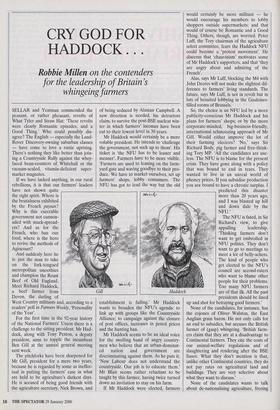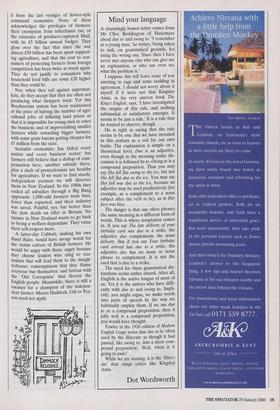CRY GOD FOR HADDOCK . . .
Robbie Millen on the contenders
for the leadership of Britain's whingeing farmers
SELLAR and Yeatman commended the peasant, or rather pheasant, revolts of What Tyler and Straw Hat: 'These revolts were clearly Romantic episodes, and a Good Thing.' Who could possibly dis- agree? The English — especially the Land- Rover Discovery-owning suburban classes — have come to love a rustic uprising.
There's nothing they like better than join- ing a Countryside Rally against the whey- faced bean-counters of Whitehall or the vacuum-sealed, vitamin-deficient super- market magnates.
If we have lacked anything, in our rural rebellions, it is that our farmers' leaders have not shown quite the right spirit. Where is the brutishness exhibited by the French paysan?
Why is this execrable government not cannon- aded with muck-spread- ers? And as for the French, who ban our food, where is the hero to revive the methods of Agincourt?
And suddenly here he is: just the man to take on the fork-tongued metropolitan smoothies and champion the Roast Beef of Old England.
Meet Richard Haddock, a beef farmer from Devon, the darling of West Country militants and, according to a readers' poll in Farmers Weekly, 'Personality of the Year'.
For the first time in the 92-year history of the National Farmers' Union there is a challenge to the sitting president. Mr Had- dock, along with Tony Pexton, a deputy president, aims to topple the incumbent Ben Gill at the annual general meeting next week.
The pitchforks have been sharpened for Mr Gill, president for a mere two years, because he is regarded by some as ineffec- tual in putting the farmers' case in what are held to be agriculture's darkest days. He is accused of being good friends with the agriculture secretary, Nick Brown, and of being seduced by Alastair Campbell. A new direction is needed, his detractors claim, to survive the post-BSE nuclear win- ter in which farmers' incomes have been cut to their lowest level in 30 years.
Mr Haddock would certainly be a more voluble president. He intends to 'challenge the government, not suck up to them'. His ticket is 'the NFU has to be leaner and meaner'. Farmers have to be more visible. 'Farmers are used to leaning on the farm- yard gate and waving goodbye to their pro- duce. We have to market ourselves, set up farmers' shops, lobby consumers. The NFU has got to lead the way but the old establishment is failing.' Mr Haddock wants to broaden the NFU's agenda: to link up with groups like the Countryside Alliance; to campaign against the closure of post offices, increases in petrol prices and the hunting ban.
Mr Haddock seems to be an ideal voice for the swelling band of angry country- men who believe that an urban-dominat- ed nation and government are discriminating against them. As he puts it, 'New Labour does not understand the countryside. Our job is to educate them.' Mr Blair seems rather reluctant to be taught by this farmer, having twice turned down an invitation to stay on his farm.
If Mr Haddock were elected, farmers would certainly be more militant — he would encourage his members to lobby shoppers outside supermarkets; and that would of course be Romantic and a Good Thing. Others, though, are worried. Peter Luff, the Tory chairman of the agriculture select committee, fears the Haddock NFU could become a 'protest movement'. He discerns that 'chauvinism' motivates some of Mr Haddock's supporters, and that 'they are angry about and admiring of the French'.
Alas, says Mr Luff, blocking the M4 with John Deeres will not make the slightest dif- ference to farmers' living standards. The future, says Mr Luff, is not in revolt but in lots of besuited lobbying in the Gauloises- filled rooms of Brussels.
So, the choice is an NFU led by a more publicity-conscious Mr Haddock and his plans for farmers' shops; or by the more corporate-minded, big-business-friendly, international schmoozing approach of Mr Gill. Would either improve the lot of their farming electors? 'No,' says Sir Richard Body, pig farmer and free-think- ing Tory MP. 'All the candidates are use- less. The NFU is to blame for the present crisis. They have gone along with a policy that was bound to end in tears. They wanted to live in an unreal world of phoney prices. If you subsidise production you are bound to have a chronic surplus. I predicted this disaster more than 20 years ago, and I was blasted up hill and down dale by the NFU.'
The NFU is fated, in Sir Richard's view, to give appalling leadership. 'Thinking farmers don't want to get embroiled in NFU politics. They don't want to go to meetings to meet a lot of belly-achers. The kind of people who get elected to the NFU's council are second-raters who want to blame other people for their problems. Too many NFU farmers are of that ilk. All the past presidents should be lined up and shot for betraying good farmers.'
None of the candidates, for instance, has the cojones of Oliver Walston, the East Anglian grain baron. He not only calls for an end to subsidies, but accuses the British farmer of (gasp) whingeing. 'British farm- ers claim that they are at a disadvantage to Continental farmers. They cite the costs of our animal-welfare regulations and of slaughtering and rendering after the BSE fiasco. What they don't mention is that, unlike other Continental countries, they do not pay rates on agricultural land and buildings. They are very selective about what they want to discuss.'
None of the candidates wants to talk about de-nationalising agriculture, freeing it from the last vestiges of Soviet-style command economics. None of them acknowledges the privileges of farmers: their exemption from inheritance tax; or the existence of producer-captured Maff, with its £5 billion annual budget. They gloss over the fact that since the war almost £50 billion has been spent support- mg agriculture, and that the cost to con- sumers of protecting farmers from foreign competition has been twice as much again.
They do not justify to consumers why household food bills are some £20 higher than they could be.
Nor, when they rail against supermar- kets, do they accept that they are often not producing what shoppers want. Yet this Brezlmevian system has been maintained at the price of halving the number of agri- cultural jobs; of inflating land prices so that it is impossible for young men to enter the business; and of impoverishing smaller farmers while rewarding bigger farmers, with some grain barons getting cheques for £1 million from the state.
Socialist economics has failed every nation and every business sector; but farmers still believe that a dollop of com- pensation here, another subsidy there, plus a dash of protectionism are healthy for agriculture. If we want to find sturdy, independent yeomen we will discover them in New Zealand. In the 1980s they ended all subsidies through a Big Bang approach: 1,000-odd farmers went bust, fewer than expected, and their industry was saved. Painful, yes, but better than the slow death on offer in Britain. No farmer in New Zealand wants to go back to being a welfare-dependant. They value their self-respect more. A latter-day Cobbett, making his own Rural Rides, would have savage words for the victim culture of British farmers. He would be angry with them; angry because they choose leaders who cling to eco- nomics that will lead them to the slaugh- terhouse; contemptuous that they blame everyone but themselves; and furious with the 'Old Corruption' that fleeces the English people. Meanwhile, there is still a vacancy for a champion of the indepen- dent farmer. Messrs Haddock, Gill or Pex- ton need not apply.



















































































 Previous page
Previous page